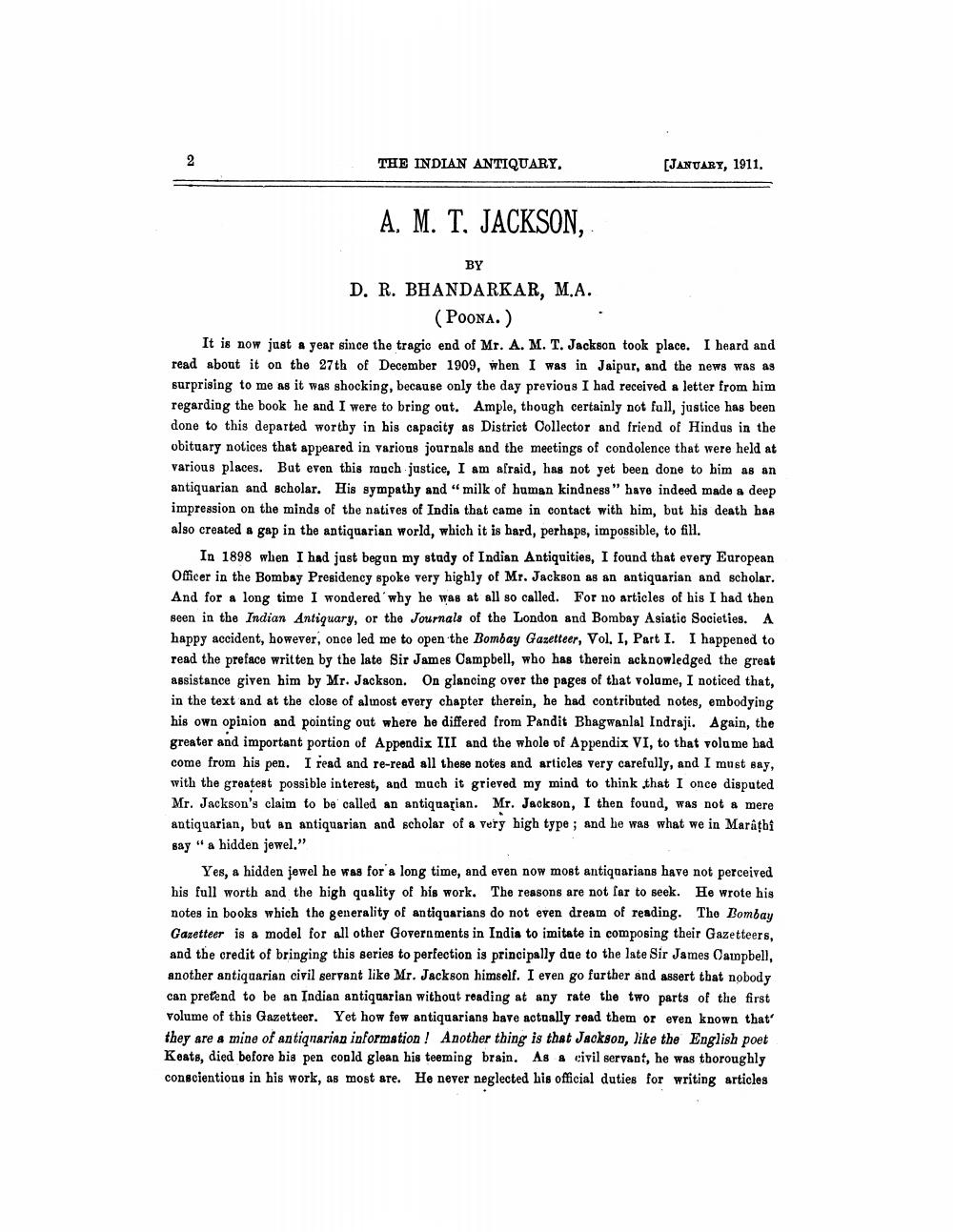Book Title: Indian Antiquary Vol 40 Author(s): Richard Carnac Temple, Devadatta Ramkrishna Bhandarkar Publisher: Swati Publications View full book textPage 8
________________ THE INDIAN ANTIQUARY, (JANUARY, 1911. A. M. T. JACKSON, BY D. R. BHANDARKAR, M.A. (Poona.) It is now just a year since the tragic end of Mr. A. M. T. Jackson took place. I heard and read about it on the 27th of December 1909, when I was in Jaipur, and the news was as surprising to me as it was shocking, because only the day previous I had received a letter from him regarding the book he and I were to bring out. Ample, though certainly not full, justice has been done to this departed worthy in his capacity as District Collector and friend of Hindus in the obituary notices that appeared in various journals and the meetings of condolence that were held at various places. But even this rauch justice, I am afraid, has not yet been done to him as an antiquarian and scholar. His sympathy and milk of human kindness" have indeed made a deep impression on the minds of the natives of India that came in contact with him, but his death has also created a gap in the antiquarian world, which it is hard, perhaps, impossible, to fill. In 1898 when I had just begun my study of Indian Antiquities, I found that every European Officer in the Bombay Presidency spoke very highly of Mr. Jackson as an antiquarian and scholar. And for a long time I wondered why he was at all so called. For no articles of his I had then seen in the Indian Antiquary, or the Journals of the London and Bombay Asiatic Societies. A happy accident, however, once led me to open the Bombay Gazetteer, Vol. I, Part I. I happened to read the preface written by the late Sir James Campbell, who has therein acknowledged the great assistance given him by Mr. Jackson. On glancing over the pages of that volume, I noticed that, in the text and at the close of almost every chapter therein, he had contributed notes, embodying his own opinion and pointing out where he differed from Pandit Bhagwanlal Indraji. Again, the greater and important portion of Appendix III and the whole of Appendix VI, to that volume bad come from his pen. I read and re-read all these notes and articles very carefully, and I must say, with the greatest possible interest, and much it grieved my mind to think that I once disputed Mr. Jackson's claim to be called an antiquarian. Mr. Jackson, I then found, was not a mere antiquarian, but an antiquarian and scholar of a very high type ; and he was what we in Marathi say " a hidden jewel." Yes, a hidden jewel he was for a long time, and even now most antiquarians have not perceived his full worth and the high quality of his work. The reasons are not far to seek. He wrote his notes in books which the generality of antiquarians do not even dream of reading. The Bombay Gazetteer is a model for all other Governments in India to imitate in composing their Gazetteers, and the credit of bringing this series to perfection is principally due to the late Sir James Campbell, another antiquarian civil servant like Mr. Jackson himself. I even go further and assert that nobody can pretend to be an Indian antiquarian without reading at any rate the two parts of the first volume of this Gazetteer. Yet how few antiquarians have actually read them or even known that' they are a mine of antiqnarian information! Another thing is that Jackson, like the English poet Keats, died before his pen could glean his teeming brain. As a civil servant, he was thoroughly conscientious in his work, as most are. He never neglected his official duties for writing articlesPage Navigation
1 ... 6 7 8 9 10 11 12 13 14 15 16 17 18 19 20 21 22 23 24 25 26 27 28 29 30 31 32 33 34 35 36 37 38 39 40 41 42 43 44 45 46 47 48 49 50 51 52 53 54 55 56 57 58 59 60 61 62 63 64 65 66 67 68 69 70 71 72 73 74 75 76 77 78 79 80 81 82 ... 388
